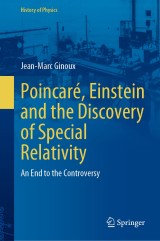Details

Poincaré, Einstein and the Discovery of Special Relativity
An End to the ControversyHistory of Physics
|
139,09 € |
|
| Verlag: | Springer |
| Format: | |
| Veröffentl.: | 16.04.2024 |
| ISBN/EAN: | 9783031513879 |
| Sprache: | englisch |
Dieses eBook enthält ein Wasserzeichen.
Beschreibungen
<p>1905 is probably the best-known year in physics, since it was the year of the discovery of the special theory of relativity. For decades, historiography has told us that Albert Einstein, then a patent examiner in Bern, succeeded in developing this theory on his own, overcoming all the difficulties that the greatest scientists of his time had not been able to solve. However, some have pointed out that, before Einstein’s first publication in this field, the French mathematician and physicist Henri Poincaré had obtained the same results, which he had published several months before Einstein. Yet today, this theory is known as Einstein’s special theory of relativity. Thus, considering the indisputable anteriority of Poincaré’s contributions, there is only one real question that needs to be answered:</p><p>Why didn’t Poincaré claim the authorship of special theory of relativity?<br></p><p>After recapping on the ideas and concepts of the special theory of relativity in a manner accessibleto non-specialists and recalling the historical context of the discovery of this theory, we will answer this question and thus put finally an end to this long-running controversy.<br></p>
Introduction.- From Luminiferous Ether to the Earth's Motion.- Principle of Relativity.- Towards a New Transformation.- Poincaré's New Mechanics.- Poincaré's Note and Memoir.- Einstein's Article of 1905.- Poincaré's Hypothesis and Results vs. Einstein's.- The Reception of the Special Relativity in Europe.- The Race for the Nobel Prize.- Conclusion.<br>
<p><br></p><p>Jean-Marc Ginoux holds a PhD in Applied Mathematics from the University of Toulon and a second doctorate in History of Sciences from the Paris Sorbonne University. He is associate professor at the University of Toulon and a specialist in nonlinear and chaotic dynamical systems and their history. He has authored or co-authored 18 books (in French or English) on aspects of this topic and its main protagonists. He has created the Jules Verne Institute: center for scientific culture.</p>
<div><p>1905 is probably the best-known year in physics, since it was the year of the discovery of the special theory of relativity. For decades, historiography has told us that Albert Einstein, then a patent examiner in Bern, succeeded in developing this theory on his own, overcoming all the difficulties that the greatest scientists of his time had not been able to solve. However, some have pointed out that, before Einstein’s first publication in this field, the French mathematician and physicist Henri Poincaré had obtained the same results, which he had published several months before Einstein. Yet today, this theory is known as Einstein’s special theory of relativity. Thus, considering the indisputable anteriority of Poincaré’s contributions, there is only one real question that needs to be answered:</p><p>Why didn’t Poincaré claim the authorship of special theory of relativity?<br></p><p>After recapping on the ideas and concepts of the special theory of relativity in a manner accessible to non-specialists and recalling the historical context of the discovery of this theory, we will answer this question and thus put finally an end to this long-running controversy.</p></div>
Sheds light on Einstein's reintroduction of the luminiferous ether Traces and reinterprets the contributions and priorities surrounding the Lorentz transformation Mathematical analysis of the derivation of the Lorentz transformation in both Poincaré's and Einstein's works

















